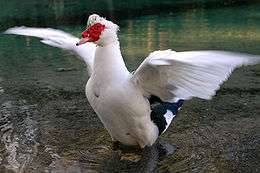Definify.com
Webster 1913 Edition
Duck
Duck
Duck
,Duck
,Duck
Other trippings to be trod.
Webster 1828 Edition
Duck
DUCK
,DUCK
,DUCK
,DUCK
,DUCK
,Definition 2026
Duck
Duck
English
Proper noun
Duck
- A surname.
- A town in North Carolina.
- An unincorporated community in West Virginia.
duck
duck
English
Verb
duck (third-person singular simple present ducks, present participle ducking, simple past and past participle ducked)
- (intransitive) To lower the head or body in order to prevent it from being struck by something.
- (transitive) To lower (something) into water; to thrust or plunge under liquid and suddenly withdraw.
- Fielding
- Adams, after ducking the squire twice or thrice, leaped out of the tub.
- Fielding
- (intransitive) To go under the surface of water and immediately reappear; to plunge one's head into water or other liquid.
- Dryden
- In Tiber ducking thrice by break of day.
- Dryden
- (transitive) To lower (the head) in order to prevent it from being struck by something.
- (Can we find and add a quotation of Jonathan Swift to this entry?)
- (intransitive) To bow.
- Shakespeare
- The learned pate / Ducks to the golden fool.
- Shakespeare
- (transitive) To evade doing something.
- (transitive) To lower the volume of (a sound) so that other sounds in the mix can be heard more clearly.
- 2007, Alexander U. Case, Sound FX: unlocking the creative potential of recording studio effects (page 183)
- The music is ducked under the voice.
- 2007, Alexander U. Case, Sound FX: unlocking the creative potential of recording studio effects (page 183)
Synonyms
- (to lower the head): duck down
- (to lower into the water): dip, dunk
- (to lower in order to prevent it from being struck by something): dip
Coordinate terms
- (to lower the head or body to prevent it from being struck): hit the deck
Derived terms
Translations
|

Etymology 2
From Middle English ducke, dukke, doke, dokke, douke, duke, from Old English duce, dūce (“duck”, literally “dipper, diver, ducker”), from Old English *dūcan (“to dip, dive, duck”), from Proto-Germanic *dūkaną (“to dive, bend down”). See verb above. Cognate with Scots duik, duke, dook (“duck”), Danish dukand, dykand (“sea-duck”), Swedish dykfågel (“a diver, diving bird, plungeon”), Middle Dutch duycker (“diver”), Low German düker (“diver”).
Noun
duck (countable and uncountable, plural ducks)
- An aquatic bird of the family Anatidae, having a flat bill and webbed feet.
- Specifically, an adult female duck; contrasted with drake and with duckling.
- (uncountable) The flesh of a duck used as food.
- (cricket) A batsman's score of zero after getting out. (short for duck's egg, since the digit "0" is round like an egg.)
- (slang) A playing card with the rank of two.
- A partly-flooded cave passage with limited air space.
- A building intentionally constructed in the shape of an everyday object to which it is related.
- A luncheonette in the shape of a coffee cup is particularly conspicuous, as is intended of an architectural duck or folly.
- 2007, Cynthia Blair, "It Happened on Long Island: 1988—Suffolk County Adopts the Big Duck," Newsday, 21 Feb.:
- The Big Duck has influenced the world of architecture; any building that is shaped like its product is called a ‘duck’.
- A marble to be shot at with another marble (the shooter) in children's games.
- (US) A cairn used to mark a trail.
- One of the weights used to hold a spline in place for the purpose of drawing a curve.
Hyponyms
- (bird): Anas platyrhynchos (domesticus), Mallard-derived domestic breeds, including Pekin, Rouen, Campbell, Call, Runner; Cairina moschata, Muscovy duck
Derived terms
Translations
|
|
|
|
|
|
See also
References
- Weisenberg, Michael (2000) The Official Dictionary of Poker. MGI/Mike Caro University. ISBN 978-1880069523
Etymology 3
From Dutch doek, from Middle Dutch doeck, doec (“linen cloth”), from Old Dutch *dōc, from Proto-Germanic *dōkaz (“cloth, rag”), from Proto-Indo-European *dwōg-, *dwōk-. Cognate with German Tuch (“cloth”), Swedish duk (“cloth, canvas”), Icelandic dúkur (“cloth, fabric”).
Alternative forms
- dook, doock (Scotland)
Noun
duck (plural ducks)
- A tightly-woven cotton fabric used as sailcloth.
- 1912, Katherine Mansfield, "The Woman At The Store", from Selected Short Stories:
- He was dressed in a Jaeger vest—a pair of blue duck trousers, fastened round the waist with a plaited leather belt.
- 1912, Katherine Mansfield, "The Woman At The Store", from Selected Short Stories:
- (in the plural) Trousers made of such material.
- 1918, Rebecca West, The Return of the Soldier, Virago 2014, page 56:
- And they would go up and find old Allington, in white ducks, standing in the fringe of long grasses and cow-parsley on the other edge of the island […].
- 1918, Rebecca West, The Return of the Soldier, Virago 2014, page 56:
Translations
Etymology 4
Potteries dialect, Black Country dialect and dialects of the former territory of Mercia (central England). Compare Danish dukke (“doll”), Swedish docka (“baby; doll”), dialectal English doxy (“sweetheart”).
Noun
duck (plural ducks)
- A term of endearment; pet; darling.
- And hold-fast is the only dog, my duck (William Shakespeare - The Life of King Henry the Fifth, Act 2, Scene 3).
- (Britain dialect, chiefly East of the Pennines) Dear, mate (informal way of addressing a friend or stranger).
- Ay up duck, ow'a'tha?
Synonyms
- See Wikisaurus:friend